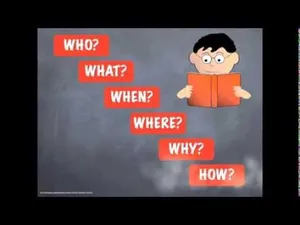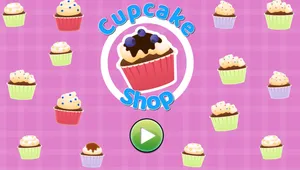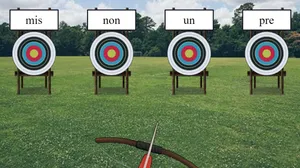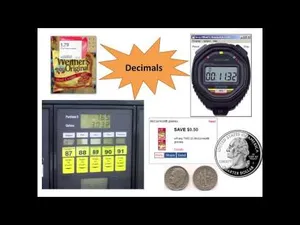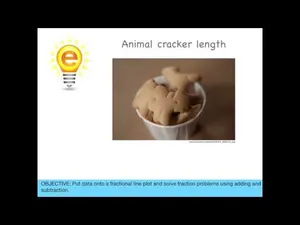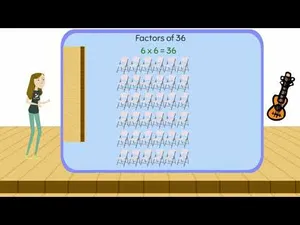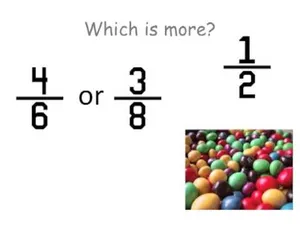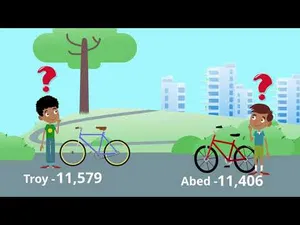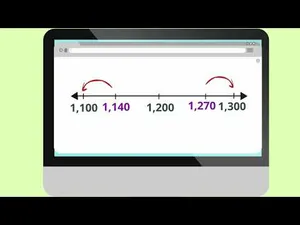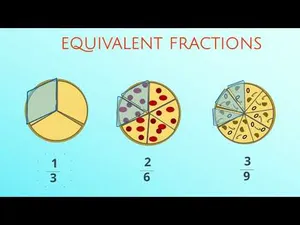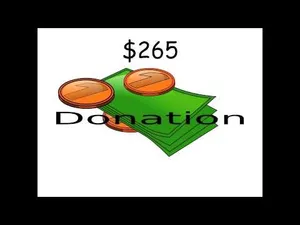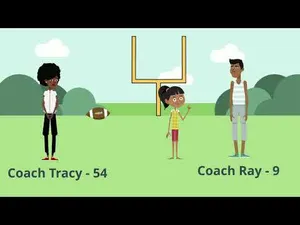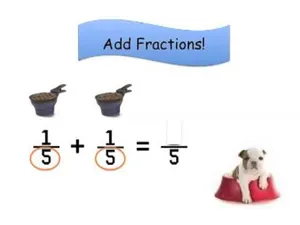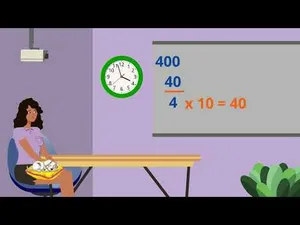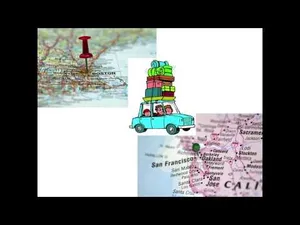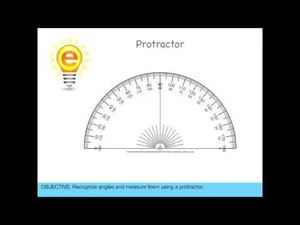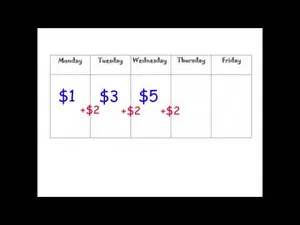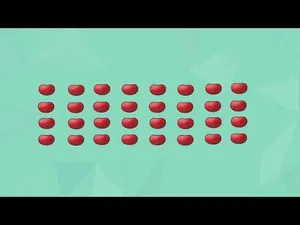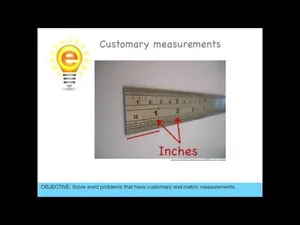Decimals and Fractions with Denominators of 10 or 100
Introducing Decimals
Using Fractional Line Plots
Fractional Line Plots
Intro to Factors and Multiples
Factors and Multiples
Converting and Comparing Fractions
Comparing Fractions
Writing and Comparing Numbers
Write and Compare Large Numbers
What is rounding? Multi-Digit Numbers
Round Multi-Digit Whole Numbers
Introduction to Equivalent Fractions
Explain Equivalent Fractions
Intro to Adding Large Numbers
Add and Subtract Multi-Digit Whole Numbers
Multiplicative Comparisons
Multiplicative Comparisons
Solve Comparison Word Problems
Multiply with Word Problems
Additive Angles / Unknown Angles
Additive Angles
Add & Subtract Fractions with Like Denominators
Add and Subtract Fractions
Place Value Multiples of Ten
Place Value and Division
Dividing a 4-Digit Dividend by a 1-Digit Divisor
Find Whole Number Quotients
Multiplying a Fraction by a Whole Number
Multiply a Fraction and a Number
Recognize Angles & Use a Protractor
Measuring Angles
Intro to Generating Patterns
Number and Shape Patterns
Intro to Prime and Composite Numbers
Prime and Composite Numbers
Multiplication Equations as Comparisons
Multiplicative Comparisons
Problems With Customary & Metric Measurements
Measurement Word Problems
Math Activities and Teaching Resources for 4th Grade
Whole numbers are easy, fractions are what separate the true mathematicians from the beginners. (This is not true, but hopefully your fourth graders feel that way).
In fourth grade, students will build on the multiplication and division skills mastered in the previous year to solve more complex problems using a variety of strategies. Pattern recognition is emphasized and place value is revisited. Students can now fluently add and subtract large numbers, compare fractions and decimals, and begin applying operations to those numbers. Various units of measurement are explored and angles and lines serve as the primary themes for most geometry work.
Enjoy this sampling of instructional videos, games, and activities for your 4th grade classroom!
Some of the skills students will master in eSpark include:
Operations and Algebraic Thinking
- Interpret a multiplication equation as a comparison; represent verbal statements of multiplicative comparisons as multiplication statements.
- Multiply or divide to solve word problems involving multiplicative comparison, e.g., by using drawings and equations with a symbol for the unknown number, distinguishing multiplicative comparison from additive comparison.
- Solve multi-step word problems posed with whole numbers and having whole-number answers using the four operations, including problems in which remainders must be interpreted.
- Find all factor pairs for a whole number in the range of 1-100; recognize that a whole number is a multiple of each of its factors; determine whether a given whole number 1-100 is a multiple of a given one-digit number.
- Generate a number of shape pattern that follows a given rule. Identify apparent features of the pattern that were not explicit in the rule itself.
Number and Operations in Base Ten
- Recognize that in a multi-digit whole number, a digit in one place represents ten times what it represents in the place to its right.
- Read and write multi-digit whole numbers using base-ten numerals, number names, and expanded form. Compare two multi-digit numbers based on meanings of the digits in each place, using >, =, and < symbols to record the results.
- Use place value understanding to round multi-digit whole numbers to any place.
- Fluently add and subtract multi-digit whole numbers using the standard algorithm.
- Multiply a whole number of up to four digits by a one-digit whole number, and multiply two two-digit numbers using strategies based on place value and the properties of operations. Illustrate and explain the calculation by using equations, rectangular arrays, and/or area models.
Number and Operations Fractions
- Explain why a fraction a/b is equivalent to a fraction (n x a) / (n x b) by using visual fraction models, with attention to how the number and size of the parts differ even though the two fractions are the same size; use this principle to recognize and generate equivalent fractions.
- Compare two fractions with different numerators and denominators, e.g., by creating common denominators or numerators, or by comparing to a benchmark fraction such as 1/2. Recognize that comparisons are valid only when the two fractions refer to the same whole. Record the results of comparisons with symbols >, =, or < and justify the conclusions.
- Understand a fraction a/b with a > 1 as a sum of fractions 1/b.
- Apply and extend previous understandings of multiplication to multiply a fraction by a whole number.
- Use decimal notation for fractions with denominators 10 or 100.
Measurement and Data
- Know relative sizes of measurement units within one system of units including km, m, cm; kg, g; lb, oz; l, ml; hr, min, sec. Express measurements in a larger unit in terms of a smaller unit.
- Use the four operations to solve word problems involving distances, intervals of time, liquid volumes, masses of objects, and money, including problems involving simple fractions or decimals, and problems that require expressing measurements given in a larger unit in terms of a smaller unit.
- Apply the area and perimeter formulas for rectangles in real world and mathematical problems.
- Make a line plot to display a data set of measurements in fractions of a unit; solve problems involving addition and subtraction of fractions by using information presented in line plots.
- Recognize angles as geometric shapes formed when two rays share a common endpoint, and understand angle measurement.
- Measure angles in whole-number degrees using a protractor; sketch angles of specified measure.
- Recognize angle measure as additive; solve addition and subtraction problems to find unknown angles on a diagram in real world and mathematical problems.
eSpark is truly unique in the world of online learning. Our holistic, student-centered approach blends the proven benefits of play-based learning with systematic, explicit, and direct instruction. It’s proof that learning can be fun, personalized, and effective, all at once!
eSpark meets the criteria for evidence-based interventions under ESSA guidelines, and has been proven in multiple studies to improve student performance in math and reading.
When you sign up for an eSpark account, your students experience these activities via adaptive, differentiated independent pathways and teacher-driven small group assignments. Teachers also have access to detailed usage and progress reports with valuable insights into standards mastery, student growth trends, and intervention opportunities.
With the addition of the game-changing Choice Texts for the 2023-2024 school year, eSpark has cemented its status as the most loved supplemental instruction option for students and teachers alike. Claim your free account today and see the difference for yourself!
